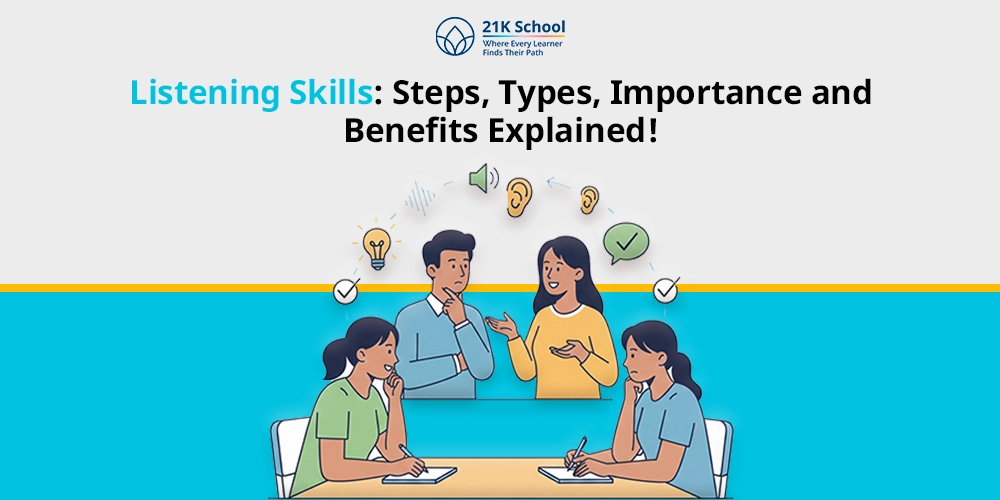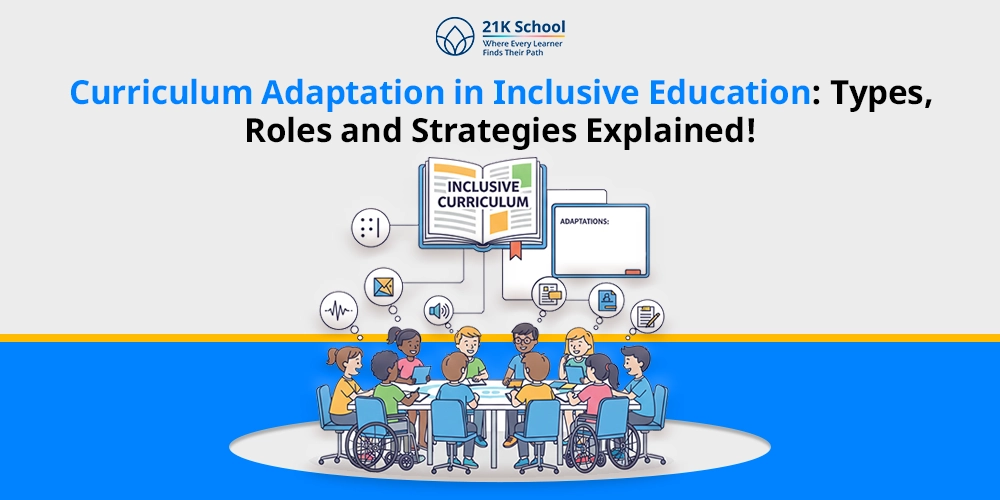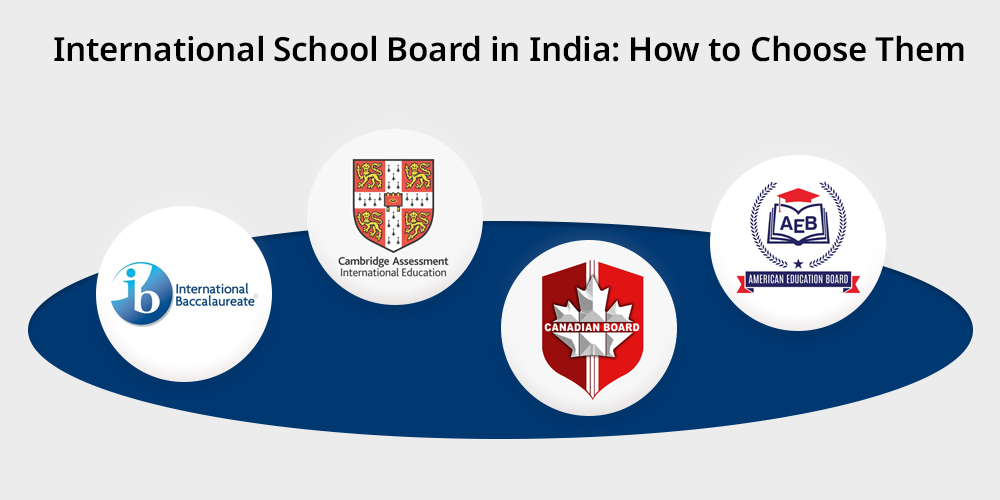
What are the International school boards in India, and how to choose them?
In India, a wide range of international school boards are there, which offer international degree programs to students. Choosing an international board is always a hectic problem for both parents and students.
International boards comply with the Indian education system and provide global standards.
International Baccalaureate (IB), Cambridge International Examination (CIE), French Baccalaureate (FB) and Canadian Board are some of the popular international boards that provide international degrees to students.
Every board has their own curriculum and teaching style, which emphasises on child’s development and provides them with practical exposure of knowledge.
While choosing an international degree, it is essential for students to consider the needs and requirements.
Students who want to attend international universities and advance their career opportunities can benefit from these international boards because they offer top-notch instruction that complies with international standards.
Table of Contents
Top International School Boards in India
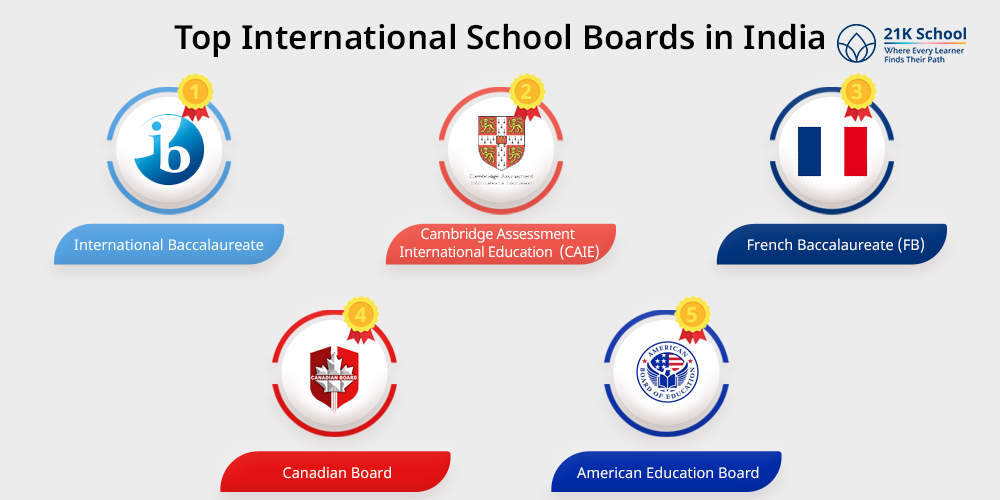
In India, there are various international school boards that follow a global curriculum and education standards.
The International Baccalaureate (IB), French Baccalaureate (FB), and Cambridge International Examination (CIE) are well-known international boards that offer degree programs to students in India. The following are the mentioned International school boards in India.
1. International Baccalaureate
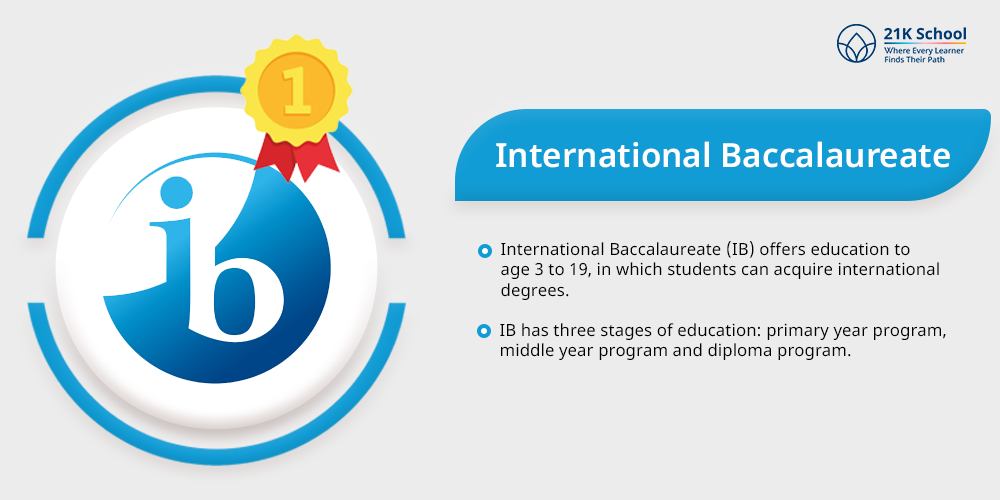
The International Baccalaureate was an educational framework in 1968 and is globally recognised and followed by more than 150 countries.
International Baccalaureate (IB) offers education to age 3 to 19, in which students can acquire international degrees.
IB has three stages of education: primary year program, middle year program and diploma program.
IB is considered one of the expensive programs which offers extensive educational degrees. In India, most schools and higher education institutes accept IB degrees.
2. Cambridge Assessment of International Education (CAIE)
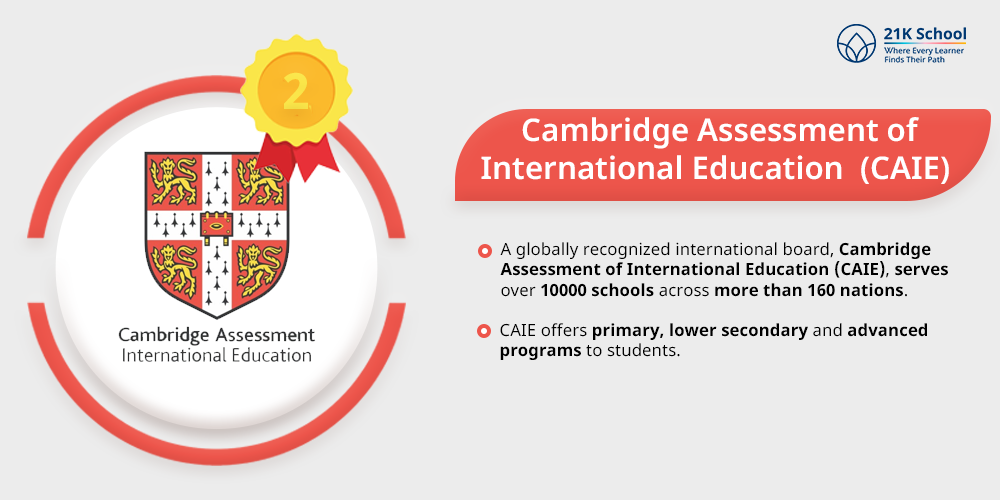
A globally recognized international board, Cambridge Assessment of International Education (CAIE), serves over 10000 schools across more than 160 nations. CAIE offers primary, lower secondary and advanced programs to students.
The University of Cambridge’s non-profit non-teaching University Press and Assessment division includes Cambridge International Examinations.
The CAIE board provides students with a flexible curriculum which focuses on students’ interests and provides them with practical exposure.
3. French Baccalaureate (FB)
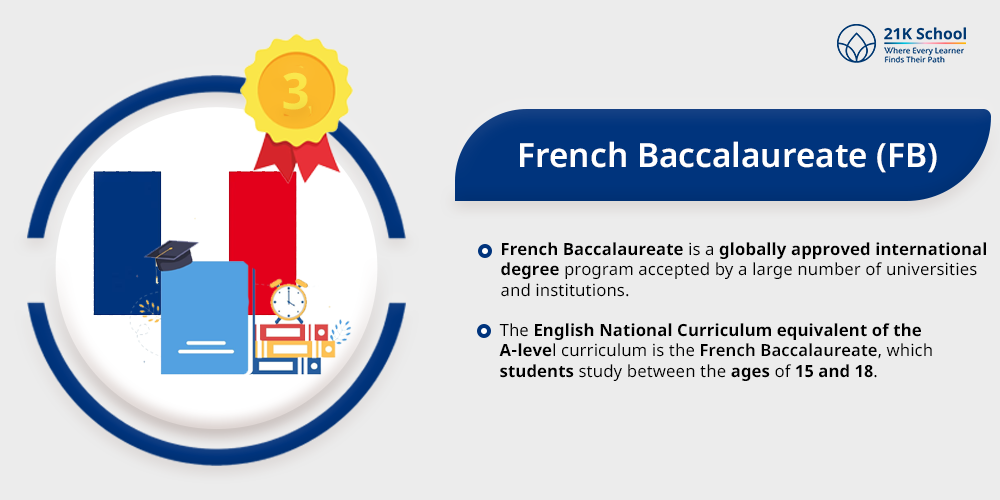
French Baccalaureate is a globally approved international degree program accepted by a large number of universities and institutions.
The English National Curriculum equivalent of the A-level curriculum is the French Baccalaureate, which students study between the ages of 15 and 18.
The French Baccalaureate follows the education system of France, which has three stages: Baccalaureate General, Baccalaureate Professional and Baccalaureate Technological. In the diploma programs, students can select any of the stages as per their interests and career goals.
Each stage of the FB has a different curriculum and education standards in which the French language is mandatory.
4. Canadian Board

The Canadian Board provides a student-centric approach that enables students to study as per their interests and pace. The Canadian board is accepted by a maximum number of schools and institutions.
The Canadian Board provides a flexible curriculum for students in classes 9 to 12. Core subjects like Science, Math, Social studies and English are covered by the Canadian board.
The Canadian Board provides students with practical learning experience as well as vocational studies for career opportunities.
The Canadian board uses a semester-based evaluation system, which includes assessments, assignments, project work, and quizzes. This makes it possible for students to take an active role in the process of teaching and learning.
5. American Education Board
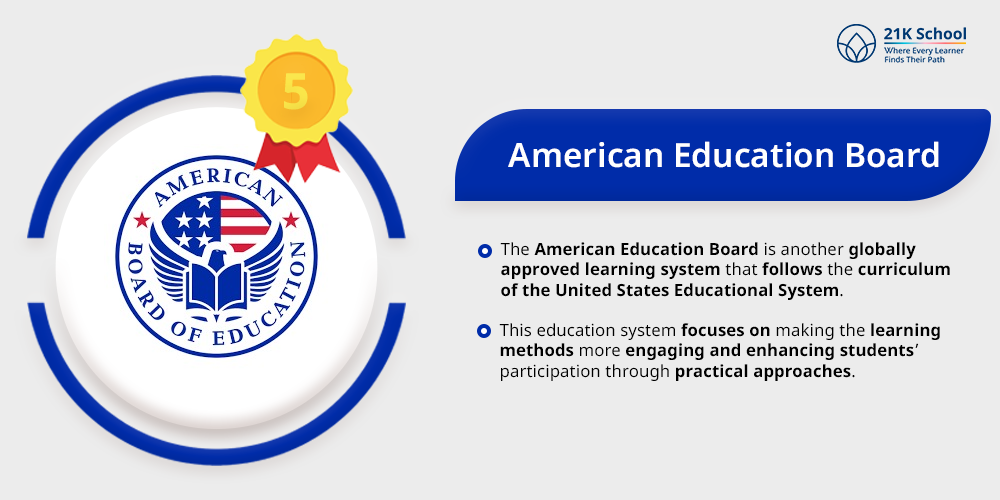
The American Education Board is another globally approved learning system that follows the curriculum of the United States Educational System. This board creates a network of universities and facilitates cross-border degrees.
This education system focuses on making the learning methods more engaging and enhancing students’ participation through practical approaches.
The American Embassy School in New Delhi, the American School of Bombay and other educational institutions in India follow AEB boards. Best practices from different international educational systems are frequently incorporated into these schools.
How to Choose the Right Board?

A wide range of international boards were incorporated into Indian education because of their global approval. Before choosing an international board it is essential to meet the demands and requirements of children.
There are various international boards, and every board has different teaching methods, curriculum, subjects, and language instruction.
It is necessary to check the requirements before selecting the board. The following are the things you should consider before selecting an international board.
1. Check Accreditation and Approval
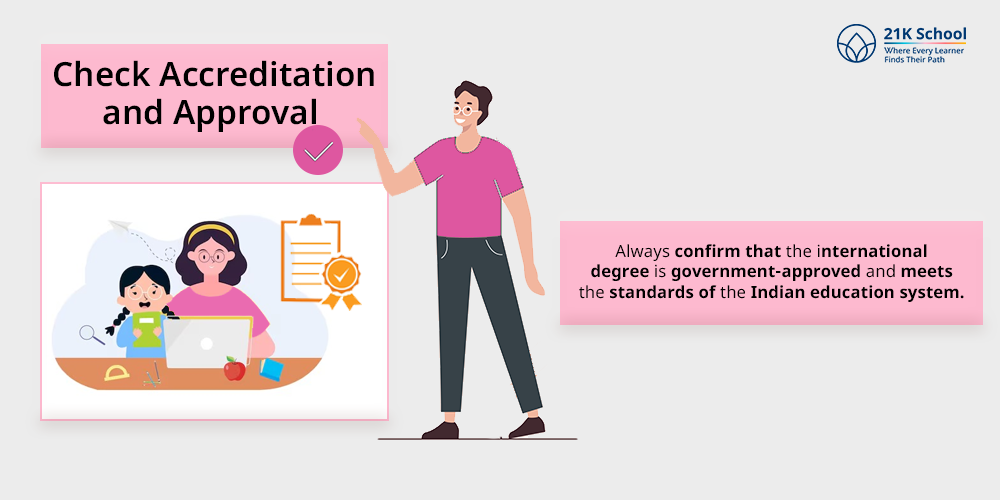
While selecting an international board, it is essential to verify the school’s recognition and accreditation. One of the most important things parents need to confirm before admission is accreditation.
Always confirm that the international degree is government-approved and meets the standards of the Indian education system.
Certificates from recognised international boards are only used to gain admission to higher education and a career.
2. Evaluate Curriculum and Courses
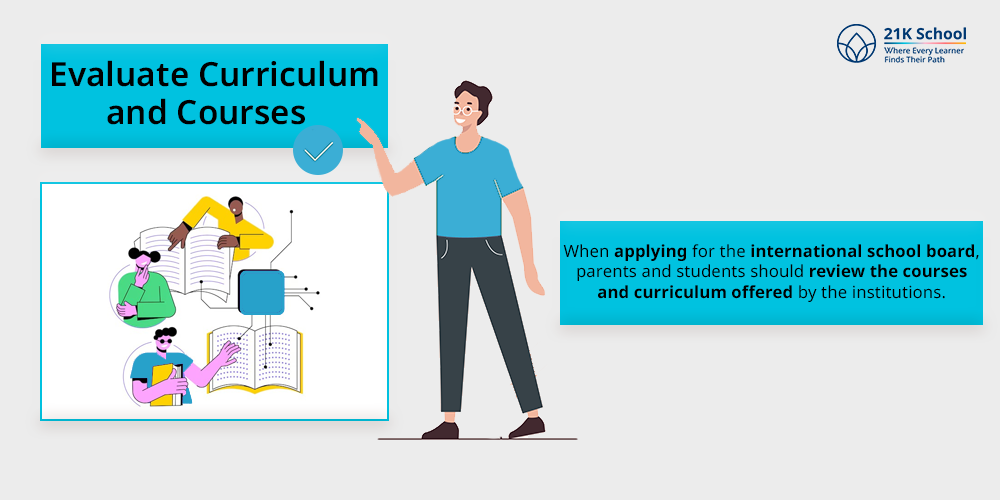
When applying for the international school board, parents and students should review the courses and curriculum offered by the institutions.
For early education, a strong curriculum is necessary that meets the requirements of students.
Every international degree has a different curriculum and courses. However, in India, mostly the American and British curricula are used by the vast majority of Indian schools and higher education institutes.
Each difference is used for instructional techniques and educational strategies.
3. Check Budget

While considering international courses, it is very vital for students and parents to check the budget.
Every international education board has their own fee structure, it is essential for parents and students to check the fee structure and then only opt for budget friendly international degrees.
There are multiple international degrees, and every degree is varied. The International Baccalaureate (IB) and Cambridge International Examination (CIE) are considered the most expensive international degrees.
4. Check Examination System
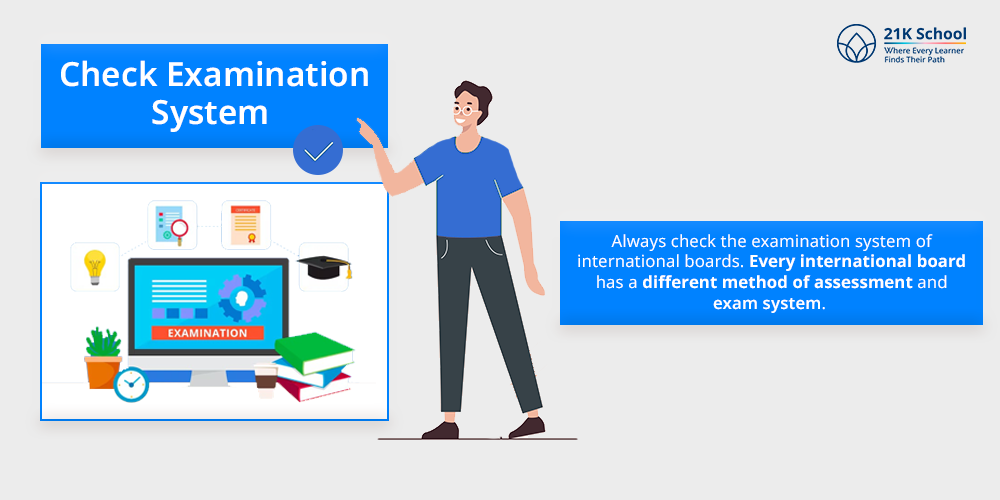
Always check the examination system of international boards. Every international board has a different method of assessment and exam system.
It is essential for parents and students to examine and evaluate each board to see if it fits your child’s preferred method of learning or not.
Some boards conduct final exams at the end of the academic year whereas some have assessment methods. IB conducts internal and external assessments to accumulate year end exams.
5. Understand Enrolling Procedure
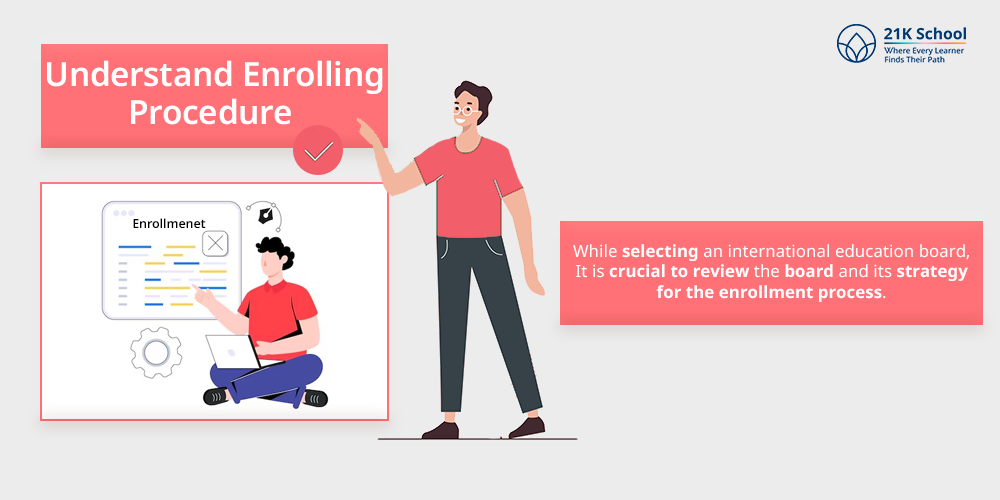
While selecting an international education board, It is crucial to review the board and its strategy for the enrollment process.
Although most international degrees provide a flexible enrollment process with little paperwork.
However, some international boards require some essential admission procedures to align with academic performance.
Advantages of International School Boards In India
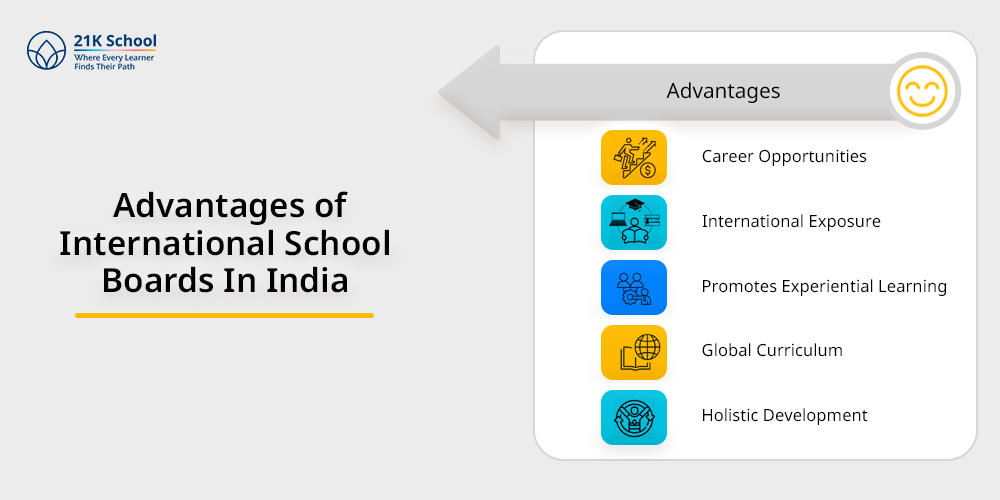
Numerous advantages of International school boards enable students to access high-quality and equitable learning opportunities.
International degrees promote global collaboration and allow students to achieve global career opportunities.
Students can participate in collaborative learning environments and collaborate globally through online schools.
International boards focus on practical skills rather than the rote method and allow students to explore different fields and opportunities. The following advantages of International school boards in India are mentioned below.
1. Career Opportunities

International school boards provide an opportunity for students to for career advancement.
Students can connect with others and form lasting relationships through the global collaboration opportunities offered by online schools.
Through skill-development programs and activities, they can improve their career prospects.
Through International degrees, students can achieve opportunities to study abroad and get jobs in the international market.
2. International Exposure
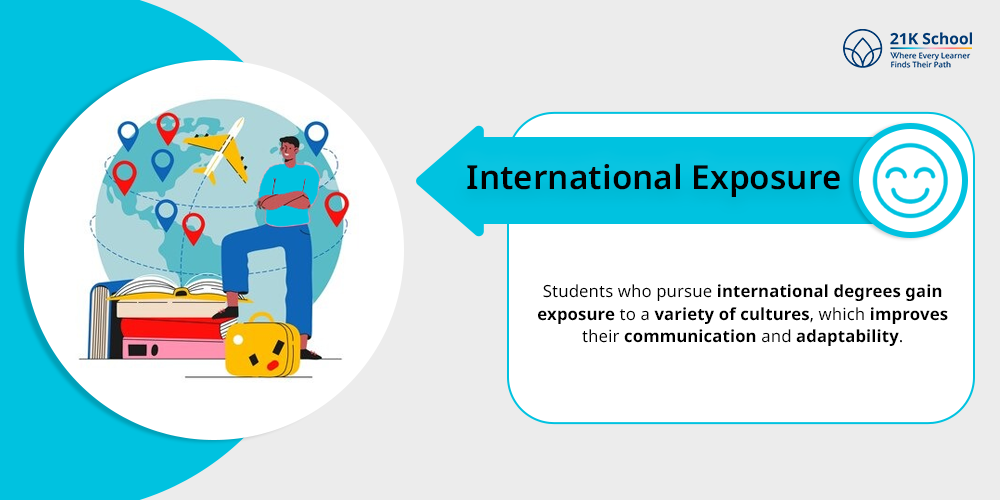
International degrees provide students with international exposure which allows them to develop collaboration skills.
Students who pursue international degrees gain exposure to a variety of cultures, which improves their communication and adaptability.
By fostering a global perspective this experience increases graduates’ competitiveness in the global job market. This allows them to develop a positive learning environment and grab future opportunities.
3. Promotes Experiential Learning

International degrees incorporate diverse cultures which fosters experiential learning and improves students’ comprehension of global perspectives and practices.
A lot of international programs offer fieldwork, internships, practical projects, group projects, and so on.
This allows students to put their academic knowledge to use in real-world situations. This gives them invaluable practical experience that helps them develop their social skills.
4. Global Curriculum
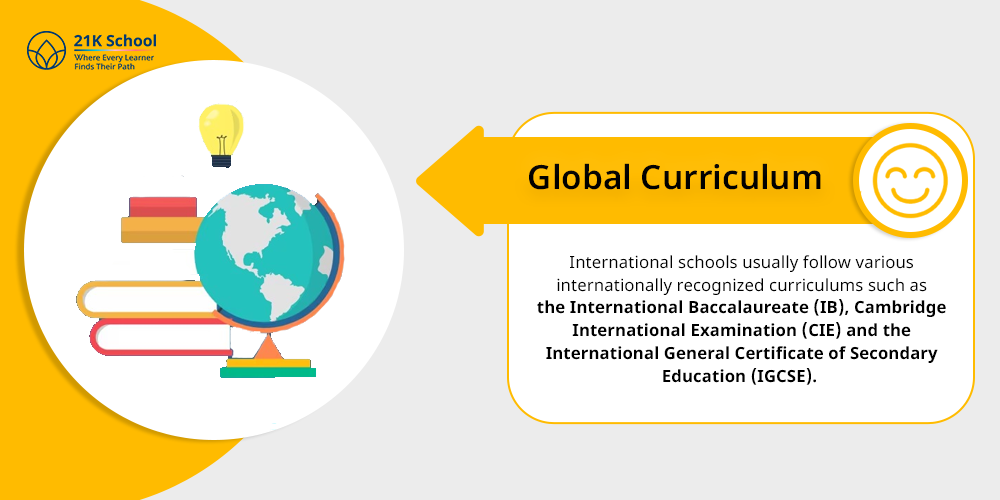
One of the advantages of International school boards is it is globally approved.
International schools usually follow various internationally recognized curriculums such as the International Baccalaureate (IB), Cambridge International Examination (CIE) and the International General Certificate of Secondary Education (IGCSE).
With an emphasis on a variety of subjects these courses foster creativity, critical thinking skills and problem-solving skills.
The global curriculum accommodates high academic standards and makes it simple for students to transfer to schools and universities across the globe.
5. Holistic Development

International degrees emphasize holistic development above and beyond academics.
International education provides a variety of extracurricular activities such as community engagement, practical work, projects works, group activities and so on.
This method focuses on holistic education and allows students to gain vital life skills, such as time management skills, leadership and cooperation.
Incorporating into international degrees students are assisted in finding their passions and gaining confidence in a variety of areas of interest.
Disadvantages of International School Boards in India
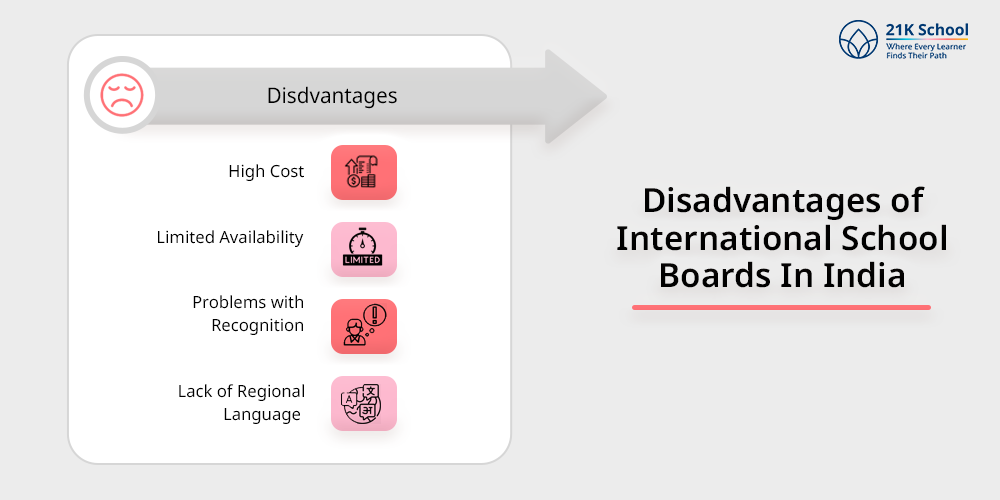
International school boards in India have various advantages that allow students to develop curiosity and practical experience.
Indulging in international degrees allows children to develop interests and enhance future job opportunities.
However, along with so many advantages International schools boards have so many disadvantages such as high cost, lack of infrastructure, limited availability and so on.
1. High Cost
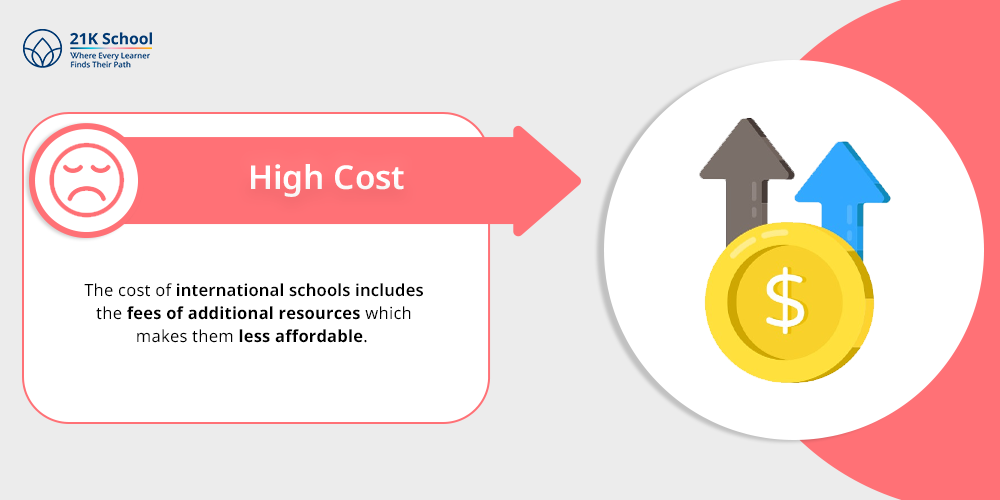
One of the major disadvantages of International school boards is high cost. Due to the high cost of tuition fees it becomes tough for the majority of students to acquire the courses.
The cost of international schools includes the fees of additional resources which makes them less affordable.
International Baccalaureate (IB) and Cambridge International Examination (CIE) are considered as the most expensive degree programs.
2. Limited Availability
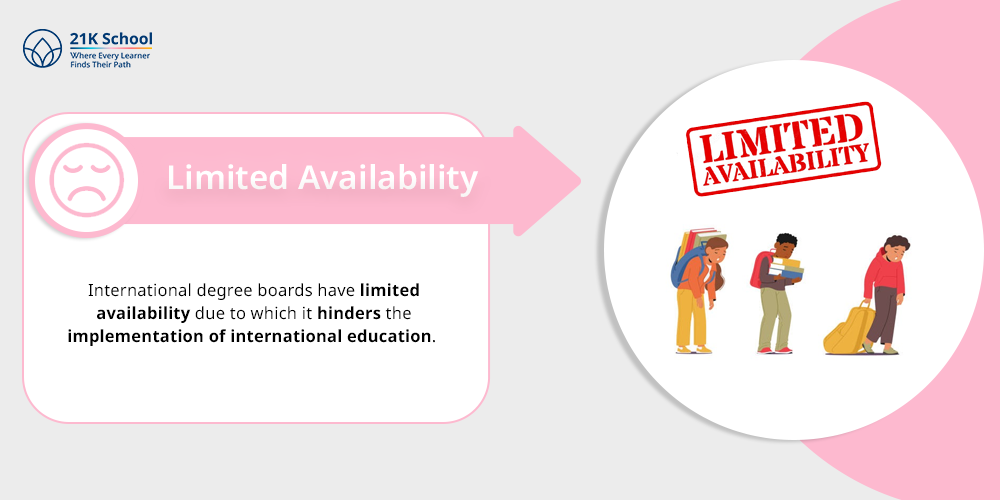
International degree boards have limited availability due to which it hinders the implementation of international education.
International programs such as International Baccalaureate (IB), French Baccalaureate (FB) Canadian Board have limited availability especially in rural areas.
Finding appropriate educational options that meet international standards can be difficult for families in many places particularly in rural or less urbanized areas where these schools are not readily available.
3. Problems With Recognition
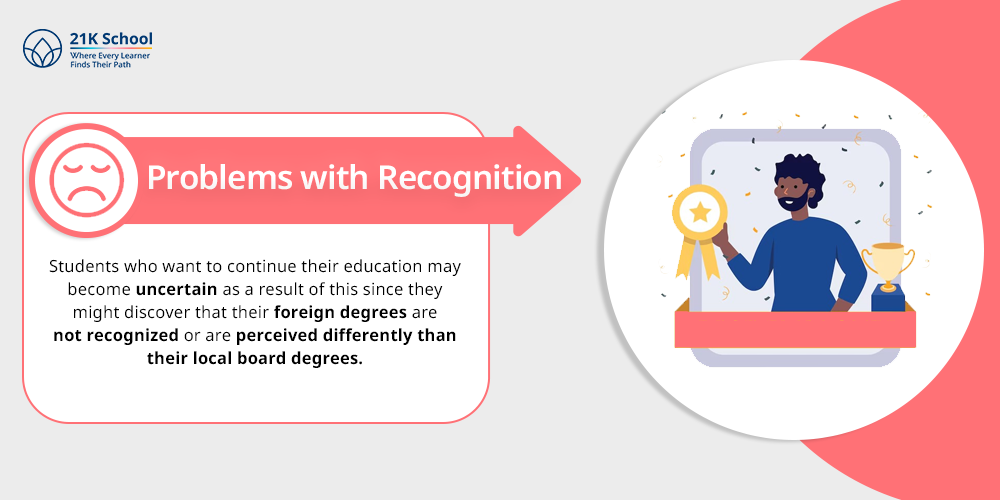
Universities and higher institutions may not always approve degrees from the international boards.
Students who want to continue their education may become uncertain as a result of this since they might discover that their foreign degrees are not recognized or are perceived differently than their local board degrees.
Due to problems with the approval and recognition it becomes tough for many students to pursue international degrees.
4. Lack of Regional Language
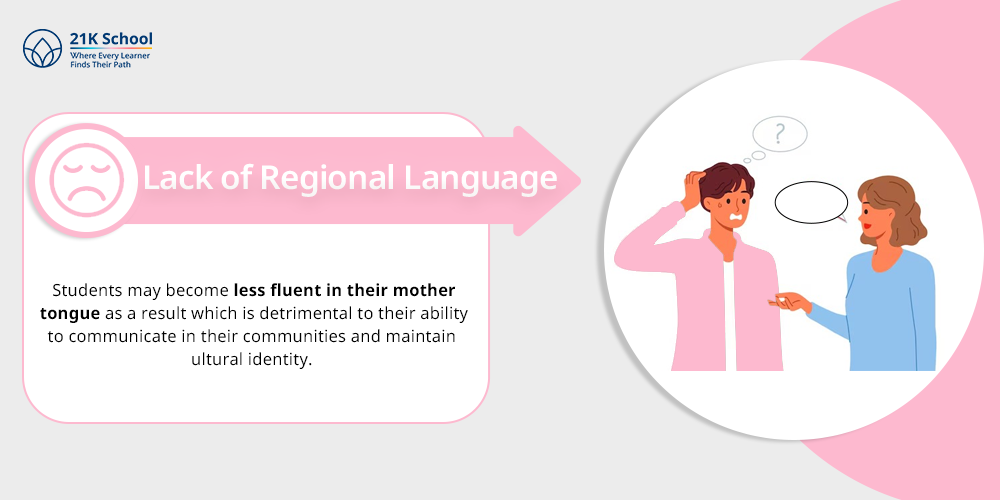
One of the major disadvantages of international school boards is that regional languages are not given enough attention in many international schools and focuses on English or other foreign languages as the primary language of instruction.
Students may become less fluent in their mother tongue as a result which is detrimental to their ability to communicate in their communities and maintain cultural identity.
Even learning a new language to acquire international degrees makes it difficult for students to communicate effectively and slows down the learning process.
Conclusion
In terms of experiential learning, global exposure and holistic development the French Baccalaureate (FB), Cambridge International Examination (CIE), International Baccalaureate (IB) and Canadian Board are among the top boards.
These boards provide unique teaching methods and curricula. In selecting the best board parents and students need to carefully consider a number of factors including curriculum budget education and testing methods.
Better career prospects and a global perspective are just two advantages of international education but it’s also vital to weigh the disadvantages which include high costs, limited availability and potential issues with recognition.

